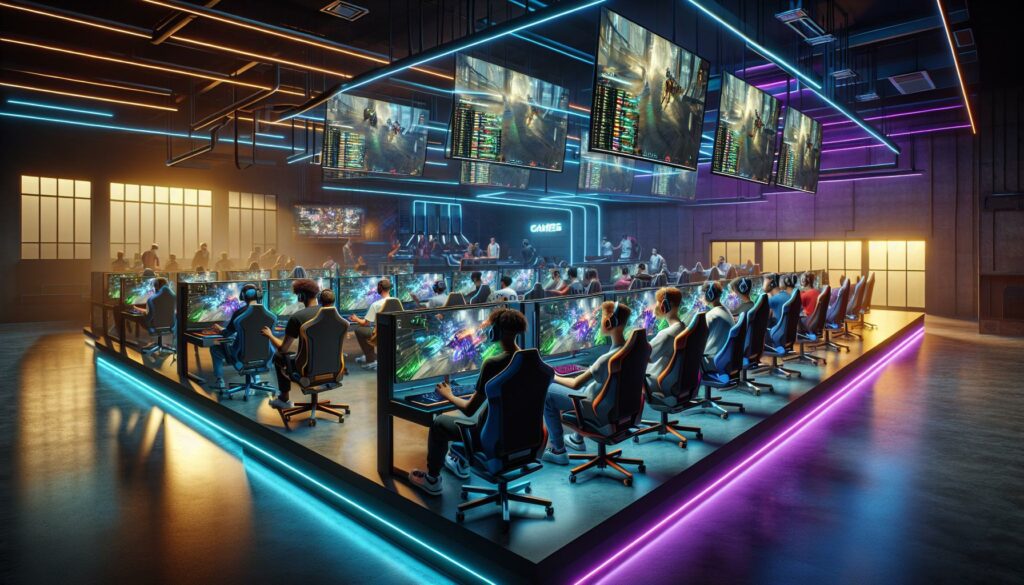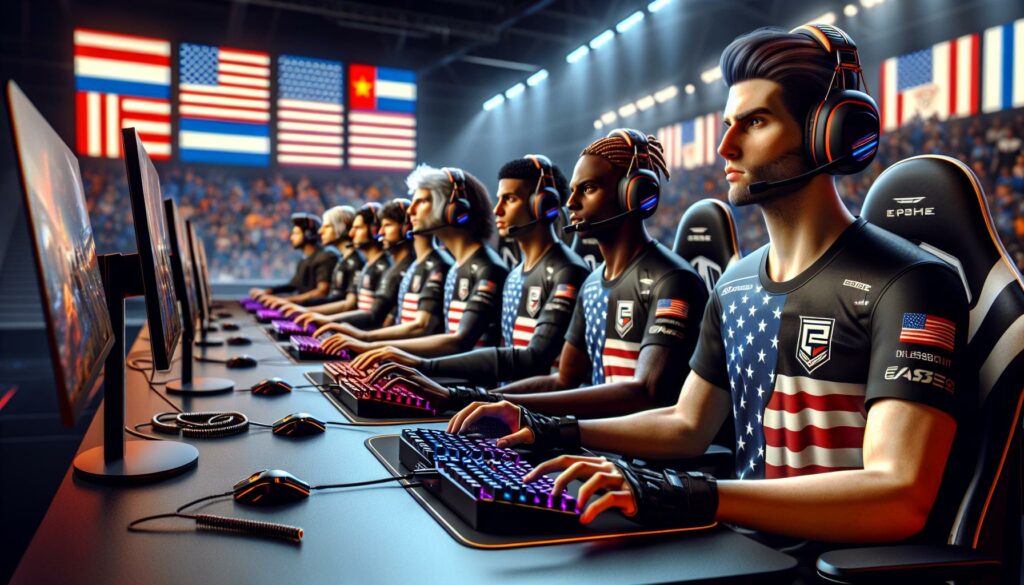I’ve watched esports evolve from basement tournaments to selling out massive arenas. As competitive gaming continues to surge in popularity, more universities are introducing esports majors to prepare students for careers in this booming industry.
Getting an esports degree isn’t just about playing video games professionally. The field combines business management, marketing, event planning, and digital media production. As someone who’s been following the industry’s growth, I can tell you that opportunities extend far beyond competing – from team management and broadcasting to tournament organization and content creation. With the global esports market projected to exceed $1.8 billion by 2025, there’s never been a better time to turn your gaming passion into a legitimate career path.
Key Takeaways
- Esports majors combine gaming expertise with business skills, including marketing, event planning, and digital media production, preparing students for diverse career opportunities beyond professional gaming.
- The global esports market is projected to exceed $1.8 billion by 2025, offering graduates various career paths with competitive salaries ranging from $45,000 to $120,000 annually.
- Core curriculum typically includes business management, game theory, event production, and digital media courses, with hands-on experience through industry-standard software and equipment.
- Leading universities offer comprehensive programs with dedicated gaming facilities, professional broadcasting equipment, and strong industry partnerships with companies like Twitch, ESL Gaming, and major game publishers.
- Significant financial aid opportunities exist through merit-based scholarships (up to full tuition), industry grants, and competitive gaming achievements, helping students fund their education.
Esports Major
An esports major combines gaming industry education with business management skills through specialized courses at accredited universities. The curriculum integrates competitive gaming principles with practical business applications.
Core Components of an Esports Degree
- Game Strategy Analysis – Studies of competitive gameplay mechanics across popular titles like League of Legends Dota 2 CS:GO
- Business Development – Marketing strategies revenue models sponsorship acquisition team management
- Event Management – Tournament organization production logistics broadcast coordination
- Digital Media – Content creation social media management video production streaming technologies
- Technology Infrastructure – Network administration gaming hardware setup IT troubleshooting
Career-Focused Coursework
Students develop professional skills through:
- Industry-standard software proficiency (Adobe Creative Suite OBS XSplit)
- Live event production techniques
- Team leadership training
- Financial planning fundamentals
- Data analytics interpretation
- Brand development strategies
| Common Course Requirements | Credit Hours |
|---|---|
| Esports Management | 3 |
| Digital Marketing | 3 |
| Event Production | 3 |
| Business Analytics | 3 |
| Gaming Culture Studies | 3 |
Industry Integration
The program connects students with:
- Professional esports organizations
- Game developers
- Tournament organizers
- Broadcasting networks
- Technology companies
These partnerships create internship opportunities mentorship programs networking events that lead to direct industry experience before graduation.
Career Opportunities for Esports Graduates
Esports graduates enter a rapidly expanding job market with diverse career paths across multiple sectors. The industry offers specialized roles that combine gaming expertise with professional business skills.
Game Development and Design
Game development positions focus on creating engaging competitive gaming experiences. Graduates work as game designers at companies like Riot Games, Blizzard Entertainment or Valve Corporation, earning average salaries of $85,000 to $120,000 annually. Key responsibilities include:
- Designing competitive game mechanics
- Balancing gameplay elements
- Creating esports-specific features
- Implementing spectator tools
- Developing tournament infrastructure systems
Tournament Management
Tournament management roles involve organizing professional gaming events from conception to execution. Event managers coordinate competitions for organizations like ESL Gaming, DreamHack or PGL, with salaries ranging from $55,000 to $95,000. Core duties include:
- Planning tournament formats
- Managing event logistics
- Coordinating broadcast production
- Overseeing prize pool distribution
- Ensuring competitive integrity
- Recruiting talented players
- Developing training programs
- Analyzing team performance
- Managing player schedules
- Creating competitive strategies
- Coordinating with sponsors
| Career Path | Entry-Level Salary | Senior-Level Salary |
|---|---|---|
| Game Development | $85,000 | $120,000 |
| Tournament Management | $55,000 | $95,000 |
| Team Management | $45,000 | $85,000 |
Core Curriculum and Coursework
An esports major combines technical gaming knowledge with business acumen through specialized academic courses at accredited universities. The curriculum integrates practical industry experience with theoretical foundations across three core areas.
Business and Marketing Classes
Business courses form the foundation of esports education with specialized modules in digital marketing analytics performance metrics entrepreneurship fundamentals. Students master financial planning skills through coursework in:
- Revenue modeling for tournament organization revenue streams
- Brand development strategies for esports teams organizations
- Market analysis techniques for identifying growth opportunities
- Social media campaign management optimization tactics
- Sponsorship acquisition negotiation methods
Game Theory and Strategy
Game theory coursework analyzes competitive gaming mechanics strategic decision-making processes competitive analysis methods. Key areas include:
- Competitive meta-analysis across popular esports titles
- Statistical analysis of player performance metrics
- Team composition strategy development techniques
- Tournament bracket systems optimization
- Real-time strategic assessment methodologies
- Live streaming technical setup configuration
- Professional audio visual equipment operation
- Stage design lighting management systems
- Tournament workflow coordination methods
- Broadcast graphics creation implementation
- On-camera presenting production techniques
| Course Component | Weekly Hours | Skills Developed |
|---|---|---|
| Business Classes | 6-8 | Marketing Analytics Strategic Planning |
| Game Theory | 8-10 | Competitive Analysis Strategic Assessment |
| Event Production | 10-12 | Technical Operations Live Broadcasting |
Top Universities Offering Esports Programs
Leading universities across the United States offer comprehensive esports programs that combine academic rigor with practical industry experience.
Notable Program Features
- Full Sail University’s esports program features a dedicated 11,200-square-foot gaming arena with professional broadcasting equipment.
- The University of California Irvine maintains 3,500 square feet of gaming space with 72 high-end gaming PCs dedicated to competitive esports.
- Ohio State University integrates medical research into its program through partnerships with the Sports Medicine Department.
- Harrisburg University provides full scholarships to varsity esports team members competing in games like Overwatch League Hearthstone.
- Miami University’s program includes access to advanced analytics labs for studying player performance data.
- High school diploma or GED with a minimum GPA of 3.0
- SAT scores: 1100+ (Math + Critical Reading)
- ACT composite score: 22+
- Personal statement demonstrating passion for esports industry
- Gaming portfolio including:
- Competition history
- Team leadership experience
- Content creation samples
- Tournament organization experience
- Letters of recommendation from:
- Academic instructors
- Esports coaches
- Industry professionals
| University | Program Type | Annual Tuition (2023) | Class Size |
|---|---|---|---|
| Full Sail | BS in Esports Production | $24,500 | 24 students |
| UC Irvine | BS in Esports Management | $34,700 | 35 students |
| Ohio State | BS in Game Studies | $28,900 | 30 students |
| Harrisburg | BS in Esports Management | $23,900 | 20 students |
| Miami University | BA in Gaming & Simulation | $31,500 | 25 students |
Industry Partnerships and Internships
Industry partnerships form the backbone of successful esports education programs, connecting students with leading companies like Twitch, ESL Gaming, and Cloud9. These partnerships provide direct access to professional environments through structured internship programs lasting 3-6 months.
Top Industry Partners
- Game Publishers: Riot Games, Blizzard Entertainment, Epic Games
- Tournament Organizers: ESL Gaming, DreamHack, PGL
- Broadcasting Networks: Twitch, YouTube Gaming, FACEIT TV
- Equipment Manufacturers: Logitech, Razer, SteelSeries
Internship Opportunities
| Position | Duration | Average Stipend |
|---|---|---|
| Event Production | 3 months | $3,000/month |
| Content Creation | 4 months | $2,500/month |
| Team Operations | 6 months | $2,800/month |
| Marketing | 3 months | $2,700/month |
Partnership Benefits
- Equipment Sponsorships: Access to professional-grade gaming peripherals
- Mentorship Programs: One-on-one guidance from industry veterans
- Tournament Access: Behind-the-scenes experience at major events
- Networking Events: Direct connections with industry professionals
- Live Event Production: Managing regional tournaments
- Content Development: Creating promotional materials
- Market Research: Analyzing viewer engagement metrics
- Brand Campaigns: Developing sponsorship strategies
These partnerships create practical learning environments where students apply classroom knowledge to real industry scenarios. Students participate in 2-3 major projects per semester, building professional portfolios through hands-on experience with industry-standard tools.
Scholarships and Financial Aid
Esports scholarships offer significant financial support for students pursuing competitive gaming careers. Notable universities provide merit-based scholarships ranging from $5,000 to full tuition coverage based on gaming achievements competitive rankings.
| Institution | Scholarship Amount | Requirements |
|---|---|---|
| Harrisburg University | Full Tuition ($23,900/year) | Varsity Team Member + 2.7 GPA |
| University of Utah | $8,000/year | Diamond+ Rank + 3.0 GPA |
| Miami University | $10,000/year | Tournament Experience + 3.2 GPA |
| Robert Morris University | $16,000/year | Competitive Record + 2.5 GPA |
Additional financial aid options include:
- Game Developer Grants from companies like Riot Games Epic Games offering $3,000-$5,000 annually
- Industry-sponsored competitions with prize pools averaging $2,500 per tournament
- Work-study positions in university gaming labs paying $12-$15 per hour
- Streaming platform partnerships providing equipment stipends worth $1,000-$2,000
Financial assistance extends to:
- Technology stipends covering gaming equipment costs
- Travel funds for competitive tournaments averaging $500 per event
- Professional certification reimbursements up to $1,000
- Conference attendance grants ranging from $250-$750
Esports athletes maintain eligibility through:
- Minimum GPA requirements between 2.5-3.0
- Mandatory practice attendance of 15-20 hours weekly
- Competition participation in 3-4 major tournaments per semester
- Academic progress monitoring with faculty advisors
- NACE Star Scholarship: $5,000 for competitive achievements
- Women in Gaming Initiative: $7,500 for female esports students
- ESL Gaming Foundation Grant: $4,000 for broadcasting focus
- Twitch Student Creator Award: $3,500 for content production
Gaming Passion
The esports industry offers an exciting blend of gaming passion and professional opportunity. I’ve seen firsthand how an esports major opens doors to diverse career paths with competitive salaries and room for growth.
From state-of-the-art facilities to industry partnerships the educational landscape provides students with everything they need to succeed. With comprehensive financial aid options and specialized programs at leading universities there’s never been a better time to pursue an esports degree.
The fusion of business acumen technical expertise and gaming knowledge creates well-rounded professionals ready to shape the future of competitive gaming. I’m confident that as the industry continues to expand esports graduates will find themselves at the forefront of this digital revolution.



